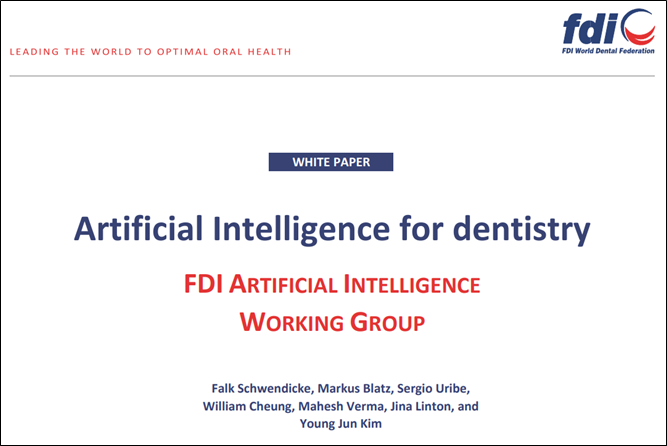RSU Professor Collaborates with Global Experts to Advance AI in Dentistry: FDI White Paper Released
The FDI World Dental Federation (FDI) has published a White Paper on using artificial intelligence (AI) in dentistry.
The report recognises AI as a key technology for the future of the dental profession and how it can help achieve the FDI's Vision 2030 strategy for optimal oral health for all.

The document has four main objectives:
- to define AI and the technology behind it for the dental community;
- to systematically show how AI can benefit dental care systems, education and research;
- to identify areas where AI can facilitate the FDI Vision 2030 strategy;
- to highlight the potential risks of AI and the need for the community to engage and implement standards, regulations and recommended practices.
The report describes the use of AI in four main areas of dentistry: individual patient care, community and public health, workforce planning and monitoring, and dental research. It also discusses the need to balance data protection and accessibility and to review conventional peer-review approaches when dealing with AI and research in complex data analytics. The report concludes with implications for clinical practice and a call to action for the dental community to engage in broad activities around AI standardisation.
The report was prepared by a group of three experts: Prof. Dr Falk Schwendicke of Charité, Berlin; Prof. Dr Markus Blatz of the University of Pennsylvania; Assoc. Prof. Dr Sergio Uribe of the Dept of Conservative Dentistry and Oral Health, Rīga Stradiņš University.
I am honoured to have been selected to be part of a team of experts led by Prof. Schwendicke from Charité Berlin and to work with them to define how AI can benefit dental care systems, education and research. Being involved in developing the FDI World Dental Federation's white paper on the use of AI in dentistry has been an incredibly enriching experience.
It is clear that AI is a crucial technology for the future of the dental profession, and I am excited about the possibilities it offers for improving oral and dental health globally. It is also important to mention the need to balance data protection and accessibility and to revisit conventional peer-review approaches when dealing with AI and research in complex data analytics.
I am very grateful for this opportunity and look forward to continuing to contribute to dentistry and AI in the future.
FDI is an international non-governmental organisation representing national dental associations worldwide. Founded in 1900, it aims to promote dental and oral health globally and improve people's quality of life by promoting good dental practices and standards. FDI is the sole dental representative at WHO and works in collaboration with other international organisations to improve oral health worldwide. FDI activities include promoting continuing dental education, research and development, promoting dental policy and regulation worldwide, and collaborating with other organisations to address global oral health issues. The FDI also has a Vision 2030 strategy to achieve optimal oral health for all.





